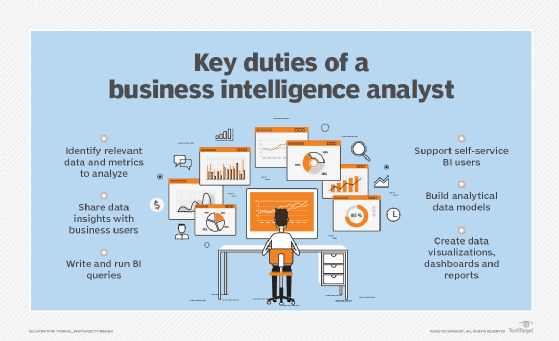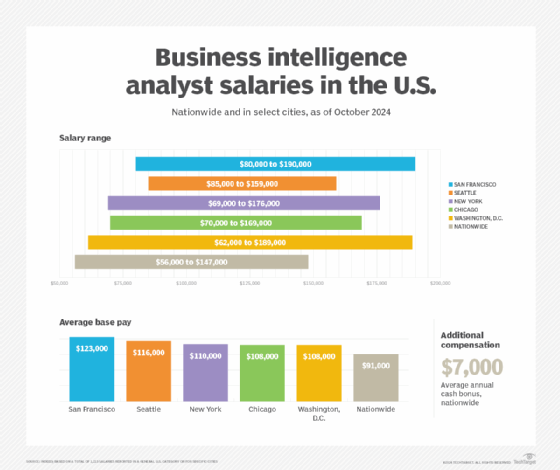What is a business intelligence analyst and what do they do?
Business intelligence analysts are key members of BI teams. Here's a look at the job, the skills it requires, salary levels and how the role of a BI analyst is evolving.
Becoming a data-driven organization is a top priority for corporate executives. As a result, enterprise leaders continue to spend money on business intelligence tools and BI applications. They also continue to invest in business intelligence analysts, who use BI software to analyze data and generate insights that help inform and guide business decisions.
What is a BI analyst?
Business intelligence analysts do much of the day-to-day work of the BI process. They gather relevant data, prepare it for analysis, run queries, interpret the results and present their findings to decision-makers. It's work that requires strong technical acumen and business knowledge, as well as critical thinking, problem-solving and communication skills.
The specific job description and responsibilities of a BI analyst can vary from one company to the next, said Kurt Schlegel, a research vice president at market research and advisory firm Gartner.
For example, some BI analysts might need to know SQL to write queries and scripts that tease out insights from data sets. Others might not require as much technical know-how and will use drag-and-drop BI tools. However, they might need to have more knowledge of business domains to help determine what issues they'll explore in BI data. "There's no one connotation for business intelligence analyst," Schlegel said.
This article is part of
Ultimate guide to business intelligence in the enterprise
Nevertheless, the primary goal is the same: to provide useful information that aids business decision-making throughout an organization.
What is the role of a business intelligence analyst?
Business intelligence analysts work with executives and other business users to identify what data is needed to answer questions and track key metrics on business performance. They then bring that data together, analyze it and create data visualizations, reports and BI dashboards to help their business colleagues understand the meaning and context of the data analysis results.
BI analysts also increasingly work side by side with business users on self-service BI deployments, training them on how to manipulate, query and analyze data themselves as part of efforts to further increase analytics speed and agility.
Through those functions, BI analysts help decision-makers understand the overall performance of a company and the state of specific business units or departments, such as sales, finance and HR. Their work also provides insight on business trends, customer behavior, new marketing opportunities and business problems that need to be addressed.
"To do this, they sit down with executives and business professionals to understand what they're trying to measure, track and better understand," said Doug Henschen, vice president and principal analyst at Constellation Research. "They then work with data management professionals to understand the applications and data sources that will provide the appropriate information [and] to have the required data extracted, integrated and transformed, as required, to support ongoing reporting and analysis."
From there, Henschen said BI analysts work iteratively with both the data management team and business stakeholders to develop and refine KPIs, visualizations, reports, dashboards and, in some cases, storyboards or briefing books. The information BI analysts provide helps guide day-to-day operational decisions and strategic planning. It also can be used to program automated responses to specific business scenarios.
Some organizations have business intelligence analysts in centralized BI teams that serve all the functional areas in the company, Schlegel said. But, he added, they increasingly work in teams placed throughout the various business units, which can then define their own BI needs. That's an approach Gartner has endorsed and labeled as a franchise model for BI and analytics.
In the latter case, BI analysts typically work directly with the business unit workers and other data experts -- i.e., data scientists and data engineers -- who are also often part of the team.
The scope of a BI analyst role varies from one organization to the next, Schlegel said. BI analysts at smaller organizations might be required to take on more technical and business responsibilities or serve a wide range of business needs, whereas BI analysts at larger organizations might be able to specialize in an area such as finance or sales.
How BI analyst differs from other BI and analytics roles
The business intelligence analyst position is just one of many roles related to BI and analytics in most organizations, with the number of such positions and their titles and responsibilities varying based on a company's size, resources and the maturity level of its BI and data management programs.
There sometimes are overlaps between the various positions, said Tim Herbert, chief research officer at CompTIA, a technology training and certification organization. In some organizations, he noted, a BI analyst might have a broader set of responsibilities than is typical, overlapping not only with other BI jobs, but the work traditionally handled by a business analyst.
"At larger firms there may be a dedicated BI architect, while, at smaller and medium-size firms, the BI analyst role, [business analyst] role and architecture role may reside with a single individual," Herbert said.
Although the differences between the roles aren't always clearly delineated, Herbert and other experts said there are some common distinctions. For example, BI analysts are typically the ones responsible for running BI queries and designing reports and dashboards. On the other hand, business analysts work with business units to gather technical requirements for operational and analytics systems, evaluate business processes and recommend internal changes, among a variety of other data-driven tasks.
Meanwhile, BI architects are commonly tasked with designing and implementing the technology infrastructure that supports business intelligence activities, including BI systems, applications and reporting tools.
Henschen said many BI architects are also responsible for setting the overarching BI and analytics strategy and overseeing how data warehouses, data models, schemas and other data architecture components support the organization's information needs. In addition, their duties often include choosing BI and analytics platforms and helping to ensure that service-level agreements and performance requirements are met.
Some companies also have BI developers, who, like BI architects, tend to have greater technical depth than BI analysts. Henschen said BI developers generally focus on exploiting APIs and SDKs and doing coding to develop analytics applications, portals, embedded BI capabilities and deeper, multidimensional analyses.
Many people use the terms BI analyst and business analyst interchangeably, said Bipin Prabhakar, chairperson of the information systems graduate programs at Indiana University's Kelley School of Business in Bloomington. However, he stressed, they're not the same role.
"A business analyst is someone who sits between IT and the business and serves [as a bridge] between them," Prabhakar said. "A BI analyst is all about data and analytics."
Important skills and job requirements for BI analysts
A business intelligence analyst needs both IT and business skills. As a result, where these positions reside within an organization varies based on enterprise structure, business needs and other factors. BI analysts might be part of a centralized BI and analytics group or be embedded in individual departments and lines of business, as Schlegel noted. Or they could fall within or be closely tied to the IT department.
Given how their role bridges the technical aspects of tasks such as data integration, data preparation and the business use of data, BI analysts need a wide range of skills.
Practitioners and consultants listed the following skills as key attributes for success in the position:
- Proficiency in understanding data and doing data modeling, profiling and validation.
- Expertise in using data mining, query, analysis, visualization and reporting tools.
- Knowledge of SQL and, for more advanced BI analyst positions that involve predictive modeling, programming languages such as Python and R.
- Familiarity with database management systems and data warehousing technologies.
- Communication, interpersonal and collaborative skills.
- Critical thinking and problem-solving abilities, as well as an inquisitive nature.
- General business acumen, plus specific industry or business domain knowledge.
- Knowledge of AI and how and where AI, machine learning and generative AI can be used to enhance business intelligence initiatives.
Some BI analysts also might specialize in working with certain types of data, such as financial or weather data, said Peter Mottram, managing director in the technology consulting practice at Protiviti. That specialization is needed because of the complexity of the data and the business needs that the data informs, and the regulations around working with and reporting on the data.
Schlegel noted that few BI analysts have all the skills an organization needs for its data and analytics programs, which is why he advises companies to build teams that collectively have the data, technical and business acumen required for business intelligence.
"Business intelligence is more of a team sport than a lone wolf," he said.

Business intelligence analyst job prospects and salary expectations
There is high demand for data professionals of all kinds, including BI analysts, according to labor studies, researchers and practitioners. For example, the U.S. Bureau of Labor Statistics has predicted that data-related occupations overall are expected to grow faster than the 5% average for all occupations over the 2021-2031 decade.
CareerOneStop, a website sponsored by the U.S. Department of Labor, labels the job outlook for BI analysts as "bright." It predicted that the number of BI analyst positions in the country would grow by 36% over the next 10 years to reach 276,000. That's an average of 20,800 projected new job openings each year.
Compensation for BI analysts often varies by location as well as industry and company size. Companies might also have different levels of BI analyst positions, with senior ones making more than junior analysts.
Although demand for BI analysts is high, some observers noted the role is evolving and predicted the position might merge with others in the organization as BI platforms become easier for business workers of all kinds to use.
"Business intelligence skills have become a core skill set that needs to be in the businessperson," Prabhakar said, adding that more and more business workers are learning how to work with data and BI software.
At the same time, he said, BI software vendors are building more self-service capabilities into their tools. AI technology -- machine learning and generative AI, specifically -- is making BI tools easier to use through the addition of augmented analytics features that aid users with data collection, preparation, analysis and visualization tasks.
Shan Duggatimatad, global data and AI-enabled analytics leader at Randstad Digital, said he sees the same trend, noting that the BI analyst role could become embedded into other positions in coming years.
Duggatimatad, Prabhakar and others said they don't think the BI analyst role will disappear completely. However, they do expect its prevalence as a standalone position will start to drop in the future.

How to become a business intelligence analyst
BI analyst jobs typically require a bachelor's degree, at minimum, preferably in fields such as business analytics, computer science, data science or statistics. Some universities offer specific BI degrees. Mathematics and business degrees are also often desirable to employers. In addition, a master's degree in business administration or business analytics can help boost an applicant's prospects in the job market.
So does earning certifications in business intelligence. Notable certifications include the following:
- Certified Business Intelligence Professional.
- Google Data Analytics Professional Certificate.
- Microsoft Certified: Power BI Data Analyst Associate.
Learning how to use particular BI tools can also be helpful in landing a job as a business intelligence analyst. Previous hands-on experience from internships or freelance work is another useful asset to list on a resume and be able to discuss in job interviews.
Mary K. Pratt is an award-winning freelance journalist with a focus on covering enterprise IT and cybersecurity management.








